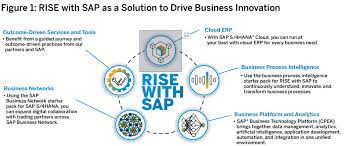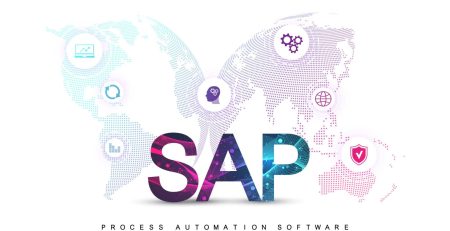Revolutionize Your Business: SAP Innovations Driving Industry Success
Unlock business success with SAP innovations! Embrace cloud solutions, industry adaptations, and future trends. Stay ahead with me!
Embracing Innovation with SAP Innovations
In today’s rapidly evolving business landscape, embracing innovation is crucial for staying ahead and driving industry success. SAP, a leading provider of enterprise software solutions, offers a range of SAP innovations that are revolutionizing businesses across various industries. Let’s explore the power of these innovations and how they drive industry success.
The Power of SAP Innovations
SAP innovations encompass a wide range of cutting-edge technologies and solutions that empower businesses to transform and optimize their operations. These innovations are designed to address the unique challenges faced by organizations in different industries and enable them to thrive in a digital world.
By harnessing the power of SAP innovations, businesses can streamline their processes, enhance productivity, and gain valuable insights from their data. From cloud-based solutions to industry-specific adaptations, SAP innovations provide the tools and capabilities necessary to drive growth, efficiency, and competitive advantage.
How SAP Innovations Drive Industry Success
SAP innovations drive industry success by addressing the specific needs and requirements of businesses operating in various sectors. Let’s explore how these innovations contribute to the success of industries:

1.Cloud-Based Solutions: SAP offers a wide range of cloud-based solutions that provide flexibility, scalability, and cost-efficiency. These solutions, such as SAP Cloud Computing, SAP Cloud Solutions, and SAP Cloud Migration, enable businesses to leverage the power of the cloud to enhance agility, accessibility, and collaboration.
2.Industry-Specific Adaptations: SAP understands that different industries have unique requirements. To address this, they offer industry-specific adaptations of their software solutions. By customizing SAP for industry needs, businesses can optimize their operations, meet compliance standards, and deliver tailored experiences to their customers. Examples of industry-specific SAP adaptations include solutions for healthcare, manufacturing, retail, and more.
3.Key SAP Innovations: SAP is at the forefront of technological advancements, and their innovations play a crucial role in driving industry success. Key innovations such as Artificial Intelligence and Machine Learning, Internet of Things (IoT) Integration, and Blockchain Technology in SAP empower businesses to automate processes, gain real-time insights, and enhance security and transparency.
Conclusion
In conclusion, embracing innovation with SAP is essential for businesses aiming to thrive in today’s dynamic and competitive landscape. By harnessing the power of SAP innovations, organizations can optimize their operations, drive industry success, and become leaders in their respective fields. Whether through cloud-based solutions, industry-specific adaptations, or key innovations, SAP provides the tools and capabilities to propel businesses forward into a successful and digitally transformed future.
Cloud-Based Solutions
As businesses embrace digital transformation, cloud-based solutions have become increasingly important in the world of SAP. These solutions offer a range of benefits, from increased flexibility to enhanced scalability and cost-effectiveness. In this section, we will explore the advantages of cloud-based SAP solutions and how they cater to specific industries.
Benefits of Cloud-Based SAP Solutions in SAP Innovations
Cloud-based SAP solutions bring numerous benefits to businesses of all sizes. By leveraging the power of the cloud, organizations can access their SAP systems and data from anywhere and at any time, allowing for greater flexibility and mobility. This is particularly advantageous for businesses with remote teams or multiple locations.
Another advantage of cloud-based SAP solutions is scalability. With traditional on-premises infrastructure, scaling up or down can be a complex and time-consuming process. However, cloud-based solutions provide the ability to easily adjust resources based on demand, ensuring that businesses can quickly adapt to changing needs.
Cost-effectiveness is another key benefit. Cloud-based solutions reduce the need for significant upfront investments in hardware and infrastructure. Instead, businesses can pay for the resources they use on a subscription basis, making it easier to manage costs and allocate resources efficiently.
Furthermore, cloud-based SAP solutions offer enhanced security and data protection. Cloud providers invest heavily in robust security measures, ensuring that data is encrypted and protected from unauthorized access. Regular backups and disaster recovery options are also typically included, providing businesses with peace of mind.

Industry-Specific Cloud Solutions
In addition to the general benefits of cloud-based SAP solutions, businesses can also take advantage of industry-specific offerings. These solutions are tailored to meet the unique needs and challenges of specific industries, delivering specialized functionalities and integration capabilities.
Industry-specific cloud solutions provide businesses with pre-configured templates and best practices that align with their industry standards and regulations. This streamlines the implementation process, allowing organizations to quickly adopt SAP solutions that are specifically designed for their industry.
For example, the healthcare industry may benefit from cloud-based SAP solutions that offer features such as electronic medical records, patient management systems, and compliance with industry-specific regulations. Similarly, the retail industry may require solutions that focus on inventory management, e-commerce integration, and customer relationship management.
By leveraging industry-specific cloud solutions, businesses can accelerate their digital transformation journey and gain a competitive edge within their respective industries.
In conclusion, cloud-based SAP solutions offer numerous advantages, including flexibility, scalability, cost-effectiveness, and enhanced security. These solutions can be further tailored to specific industries, enabling businesses to leverage specialized functionalities and industry best practices. To learn more about SAP cloud computing and cloud migration, check out our articles on SAP cloud computing and SAP cloud migration.
Industry-Specific Adaptations
In order to meet the unique needs and requirements of different industries, customizing SAP (Systems, Applications, and Products) becomes essential. By tailoring SAP solutions to specific industries, organizations can maximize efficiency, improve processes, and drive success. Let’s explore the importance of customizing SAP for industry needs and look at some examples of industry-specific SAP adaptations.
Customizing SAP for Industry Needs
Each industry has its own set of challenges, regulations, and specific requirements. To address these complexities, SAP offers the flexibility to customize its solutions, ensuring that businesses can meet their industry-specific needs effectively.
By customizing SAP, organizations can streamline their operations, integrate industry-specific processes, and optimize workflows. This enables businesses to leverage the full potential of SAP’s capabilities, driving efficiency, productivity, and growth.
Whether it’s modifying existing SAP modules or developing new functionalities, customizations can be made to align with industry-specific terminology, workflows, and compliance standards. This allows businesses to tailor SAP to their unique operational models, ensuring a seamless fit within their industry.
Examples of Industry-Specific SAP Adaptations
Let’s take a look at a few examples of how SAP can be adapted to meet the specific requirements of different industries:
| Industry | SAP Adaptations |
|---|---|
| Manufacturing | Customized production planning and scheduling modules to optimize manufacturing processes, real-time inventory management solutions for enhanced supply chain visibility, and integration with shop floor systems for seamless data exchange. |
| Retail | Customized point-of-sale (POS) systems for efficient sales transactions, integrated customer relationship management (CRM) modules to enhance customer engagement and loyalty, and advanced analytics for better demand forecasting and inventory management. |
| Healthcare | Customized electronic medical records (EMR) modules to ensure compliance with industry regulations, integrated billing and claims management solutions for efficient revenue cycle management, and real-time analytics for improved patient care and operational efficiency. |
| Financial Services | Customized risk management solutions for regulatory compliance, integrated core banking systems for efficient transaction processing, and real-time analytics for fraud detection and prevention. |
These examples highlight how SAP can be tailored to suit the specific needs of different industries, enabling businesses to optimize their operations and achieve industry-specific goals.
By embracing SAP innovations and customizing them to meet industry requirements, organizations can stay ahead of the competition, drive digital transformation, and achieve long-term success. The adaptability of SAP allows businesses to capitalize on the benefits of cloud-based solutions, industry-specific functionalities, and emerging technologies.
To explore more about SAP’s role in industry-specific adaptations and the future trends in SAP, continue reading our articles on SAP cloud solutions and SAP future trends.
Key SAP Innovations
In the constantly evolving landscape of technology, SAP continues to drive innovation and shape the future of businesses across industries. Here, we explore three key SAP innovations that are revolutionizing the way organizations operate: Artificial Intelligence and Machine Learning, Internet of Things (IoT) Integration, and Blockchain Technology in SAP.
Artificial Intelligence and Machine Learning
Artificial Intelligence (AI) and Machine Learning (ML) are transforming the way businesses leverage data and make informed decisions. With SAP’s integration of AI and ML capabilities, organizations can extract valuable insights from vast amounts of data, enabling them to identify patterns, predict outcomes, and automate processes.
By leveraging AI and ML within the SAP ecosystem, businesses can enhance their operational efficiency, optimize resource allocation, and improve customer experiences. From intelligent chatbots and virtual assistants to predictive analytics and automated workflows, AI and ML empower businesses to make data-driven decisions and stay ahead in a rapidly evolving market.
Internet of Things (IoT) Integration
The Internet of Things (IoT) has ushered in a new era of connectivity, enabling organizations to gather real-time data from various devices and sensors. SAP’s integration of IoT capabilities allows businesses to harness the power of connected devices, enabling them to monitor assets, track inventory, and optimize operations.
By seamlessly integrating IoT with SAP systems, businesses can achieve greater visibility and control over their operations. This integration enables proactive maintenance, supply chain optimization, and enhanced asset management. The data collected from IoT devices can be analyzed within the SAP ecosystem, providing actionable insights for improved decision-making and efficiency.
Blockchain Technology in SAP
Blockchain technology is revolutionizing the way transactions and data are recorded, verified, and secured. SAP’s integration of blockchain technology provides businesses with enhanced transparency, traceability, and security in their operations.
By leveraging blockchain within the SAP ecosystem, organizations can streamline supply chain processes, enable secure and transparent transactions, and enhance data integrity. Blockchain technology ensures that data remains tamper-proof and trustworthy, reducing the risk of fraud and improving trust among different stakeholders.
The integration of these key SAP innovations, including Artificial Intelligence and Machine Learning, Internet of Things Integration, and Blockchain Technology, empowers organizations to transform their operations, leverage data-driven insights, and drive innovation in their respective industries. As businesses continue to embrace digital transformation, SAP’s commitment to innovation positions them as a leading provider of intelligent solutions that can propel businesses forward into the future.
GETTING STARTED
Transform Your Business Today - Get Your Custom Quote Now
- Tailored Solutions: Receive a personalized quote that aligns perfectly with your business needs and goals.
- Expert Guidance: Leverage Orlando Monteiro's extensive experience in business transformation and digital innovation.
- Cost-Effective Strategies: Discover how you can optimize your operations and reduce costs with our expert solutions.
- Immediate Impact: Start seeing tangible results in your business efficiency and productivity right away.
- Long-Term Success: Embark on a journey towards sustainable growth and competitive advantage with our strategic guidance.
Enter Details in This Form:
Future Trends and Considerations
As the world of technology continues to evolve, so does the landscape of SAP. Staying up-to-date with emerging trends and innovations is crucial for SAP professionals, IT managers, and business leaders. In this section, we will explore the future trends and considerations in SAP, including emerging technologies, staying ahead with SAP innovations, and the role of SAP professionals and business leaders.
Emerging Technologies in SAP
SAP is constantly at the forefront of embracing emerging technologies to drive innovation and success. Two prominent technologies making waves in the SAP ecosystem are Artificial Intelligence (AI) and Machine Learning (ML).
AI and ML are revolutionizing the way businesses operate by enabling intelligent automation, predictive analytics, and data-driven decision-making. SAP leverages these technologies to enhance various aspects of business processes, such as customer experience, supply chain management, and financial forecasting. By harnessing the power of AI and ML, organizations can unlock new levels of efficiency, productivity, and competitiveness.
Another significant emerging technology in the SAP domain is the Internet of Things (IoT). IoT integration with SAP enables the seamless connection of devices, sensors, and systems, allowing for real-time data collection and analysis. This integration empowers businesses to optimize operations, improve asset management, and enhance customer experiences through personalized and context-aware services.
Staying Ahead with SAP Innovations
To stay ahead in the fast-paced world of SAP, it is crucial to embrace and leverage the latest innovations. SAP continuously introduces new features, updates, and functionalities to enhance its solutions and cater to changing business needs. This includes advancements in cloud-based solutions, industry-specific adaptations, and cutting-edge technologies.
SAP professionals and business leaders must actively engage in continuous learning and professional development to keep pace with these innovations. This can involve attending industry conferences, participating in training programs, and staying updated on the latest SAP announcements and releases. By staying ahead with SAP innovations, professionals and leaders can drive business success and maintain a competitive edge.
The Role of SAP Professionals and Business Leaders
In this era of rapid digital transformation, the role of SAP professionals and business leaders is more critical than ever. SAP professionals are responsible for the configuration, implementation, and maintenance of SAP solutions, ensuring optimal performance and alignment with business objectives.
Business leaders, on the other hand, play a vital role in driving the adoption and integration of SAP innovations within their organizations. They are responsible for aligning technology strategies with business goals, fostering a culture of innovation, and making informed decisions regarding SAP investments.
By collaborating closely, SAP professionals and business leaders can maximize the value derived from SAP solutions and drive business success. This partnership ensures that the SAP ecosystem is leveraged to its full potential, enabling businesses to thrive in the ever-evolving digital landscape.
As the future unfolds, SAP professionals and business leaders must remain agile, adaptable, and open to embracing new technologies and innovations. By doing so, they can navigate the dynamic SAP landscape with confidence and drive industry success.
For more information on SAP cloud solutions and their benefits, our article on SAP cloud computing provides valuable insights. Additionally, you may find our articles on SAP digital transformation, SAP intelligent enterprise, SAP cloud solutions, and SAP cloud migration useful for further exploration of SAP trends and solutions.












Comment (1)
[…] The benefits of SAP cloud migration go beyond scalability, cost efficiency, and performance. Businesses can also leverage industry-specific adaptations, customize solutions to meet specific needs, and ensure compliance and security considerations. To explore these further, refer to our article on SAP innovations. […]